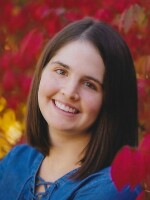Dr. Brittney Marshall has been working in rural healthcare since her clinical days – now as the resident physician at the Family Medicine Clinic in Fayette.
She spoke about why she chooses to work in – and loves rural medicine.
Missouri Health Talks gathers Missourians’ stories of access to healthcare in their own words.
Dr. Brittney Marshall: So, I really like my current clinic in Fayette. I like that it is rural, and I get the rural healthcare experience and that feel of being in that small, tight knit community.
But it's also nice to still be working as a part of the greater Mizzou system where I know that I have access to specialists.
So, I think regardless of what field of medicine you're in – it's important to be able to know how to use your resources, and I think that's especially true in primary care because we're kind of jack of all trades – we see everything, we treat everything.
I definitely think that getting to work in more than one environment, it really helps you grow because everyone does things slightly different.
You also learn from patients too, and even though both Sedalia and Fayette are very rural populations and there's a lot of similarities, there's still a lot of differences in, you know, the major industries and the major employers that are in the area. That affects a lot of how people receive their health care.
"It’s very humbling and very nice whenever patients trust me to that level. Sometimes it's like, “Well, I guess I get to be a pulmonologist today or a cardiologist,” and I think that that makes me a better doctor."Dr. Brittany Marshall
The immigration populations are very different. I really don't see a lot of like, non-English speaking patients in Fayette, but I saw them all the time in Sedalia – there’s a very large Hispanic population, lots of Ukrainian populations. So, we were frequently using translators in our clinics there, because a lot of patients didn't speak English.
You know, you come across people who don't necessarily trust doctors, and so, once you, as their primary care provider, have earned their trust, they're like, “Why would I go all the way to Columbia? Why can't you just take care of it, doc, you're a doctor?”
It’s very humbling and very nice whenever patients trust me to that level. Sometimes it's like, “Well, I guess I get to be a pulmonologist today or a cardiologist,” and I think that that makes me a better doctor, too.
There are some stigmas that maybe people in rural areas are not as educated, not as health literate.
There's always the stereotype of the farmer who never goes to the doctor and has been having crushing chest pain for a week. “Oh, it's fine. I gotta finish the fence.”
I think that's not always the full picture. They're not always choosing to not come to the doctor just because they don't care about their health, you know, sometimes it's that they've had a really bad experience and now they don't trust the healthcare system – or they don't have the time because they're a farmer and they're really busy – or they can't afford it.
You know, sometimes, taking the approach of taking longer and really trying to spend time with my patients, it can wear on your mental health a little bit.
Just because I can’t shut down, I have to be emotionally invested, but not let it affect you too much, and so, sometimes drawing that boundary can be a little bit difficult.
But overall, it fills my cup more whenever I'm taking that time to be genuine and take time with my patients.
I could talk all day about how much I love rural medicine despite the challenges.



